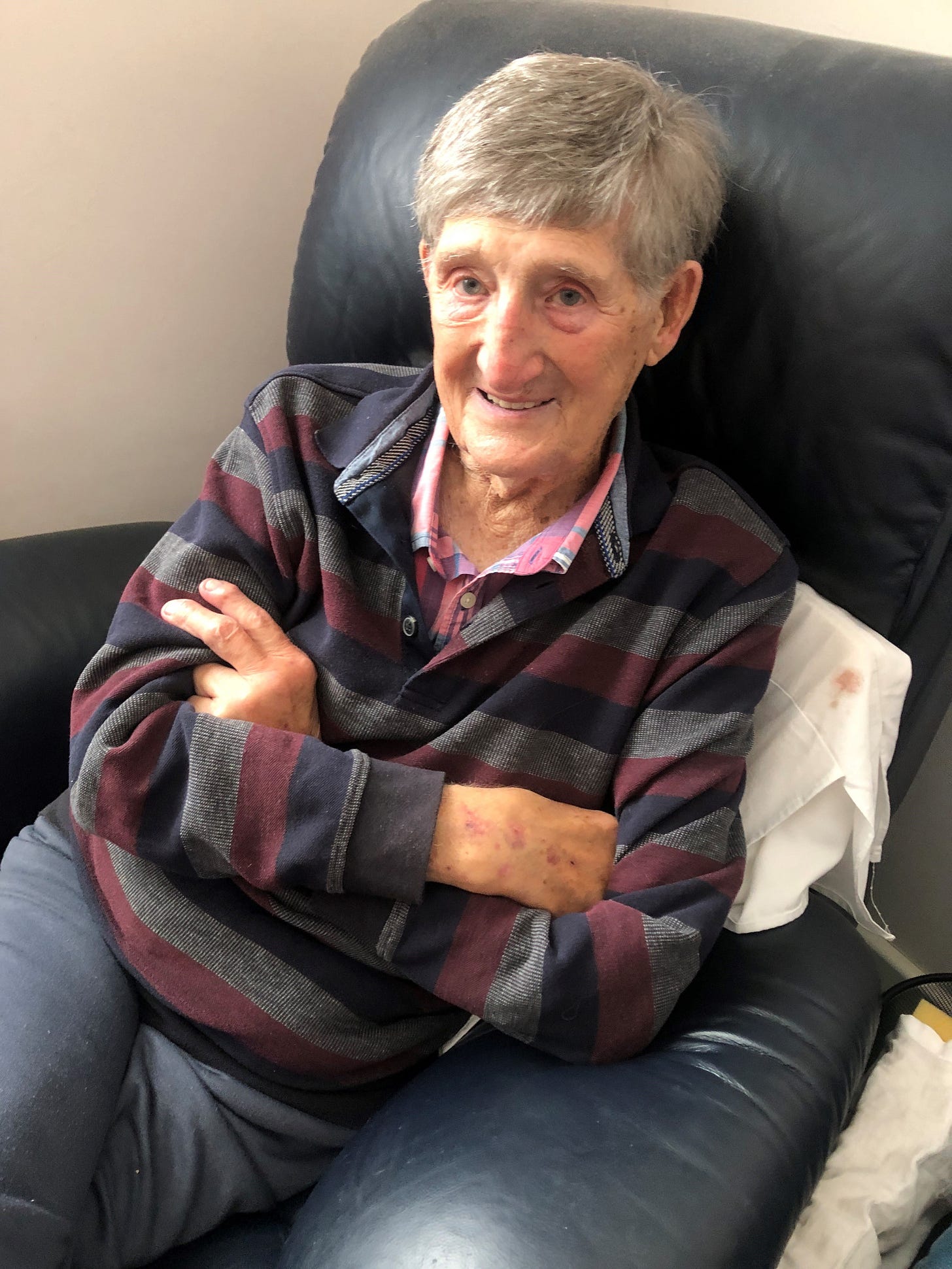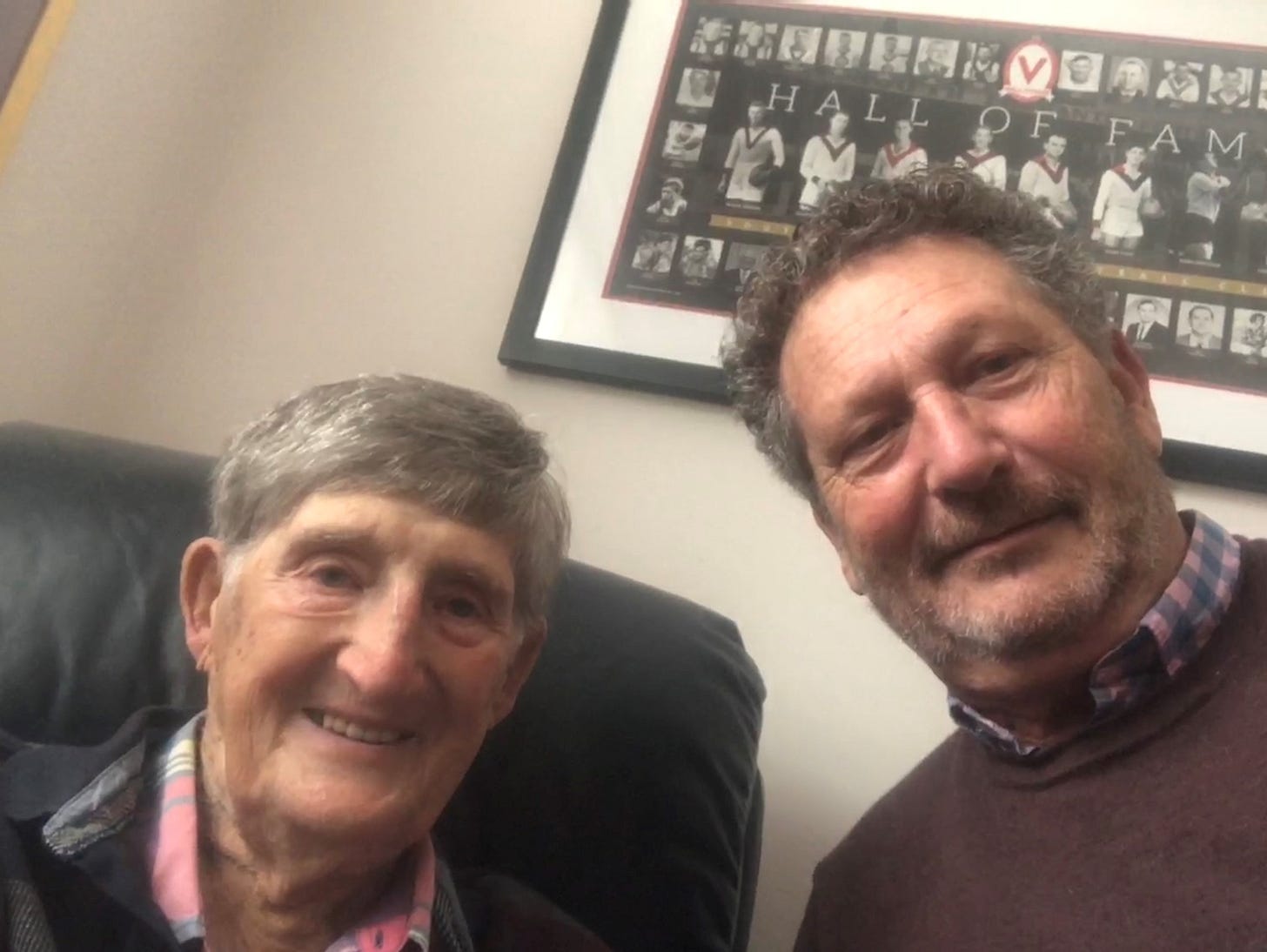“You’ve got no guts.”
John Todd had those words ringing in his ears every time he ran onto the football field, forced himself to the top of another sand dune or completed a lap at training with his shredded knee screaming at him to stop.
The words were those of his mother Doris who plunged a dagger into her son’s heart with what, at first appeared a merciless assessment of his character but was, in reality, her method of motivating and inspiring him to overcome a catastrophic knee injury.
It worked.
I don’t know if that story has been revealed previously but it came from the purest source – John Todd himself in what was the final interview of a life in which 70 of his 86 years were spent in the public eye.
The most confronting moment came when he was 18, had just won the Sandover Medal and had the extraordinary talent, self-belief and determination needed to become the greatest footballer the game had seen, only to suffer the most infamous knee injury in WA sporting history.
Everything he did after that, including coaching West Coast and winning six WAFL premierships, was informed and overshadowed by that devastating moment.
“I was never the same after the injury,” Todd told me last week.
John Todd at home last month in his final interview.
“I learned something out of that incident, though, and it came from my mother.
“She always knew how to push my buttons.
“I went to two knee specialists who said I wouldn’t be able to play again and then saw a third who said I might be able to play if I only ran in a straight line and didn’t fly for any marks.
“That was absolutely devastating. I went home and said ‘I think I’m done’.
“My mother then sat me down, looked me in the eye and simply said ‘You’ve got no guts’.
“Coming from your mother, who you would think might have a bit of sympathy, was tough to take.
“I don’t know if she was trying to inspire me to get back to football or if that was just her way.
“It worked, though.
“Every time I was in the gym, or running up sandhills at the beach, or slogging laps of the oval, those words were ringing in the back of my head.
“And I never played another game of football without her voice in my ear.
“I’m not sure she did it to give me inspiration but it worked. It worked.”
He went on to explain that he believed to his core that he could have been football’s greatest player but lived for seven decades with the regret of that loss.
The only other regrets that came close were his decision not to select injured Swan Districts captain Brad Shine in the 1990 WAFL grand final and his entry in the Australian Hall of Fame as a coach rather than a player.
The injustice of that latter point rankled from his induction in 2003 until his final breath.
Todd died this week as the elder statesman of WA football and a profound and massively influential figure for hundreds, if not thousands, of footballers and people associated with the game.
I had been trying to interview him for some time for a book project but it became apparent recently that time was running out and that it need to be done soon or not at all.
John was keen to do it as well after we had struck up a solid relationship in recent years during our involvement on the WA Football Hall of Fame selection panel.
It was apt that the news of his death was relayed to the current selectors after our annual meeting on Tuesday.
Todd’s coaching philosophy was to test his players’ mental capacity, sometimes with words as cruel as those of his mother’s, other times by pushing his charges far beyond their physical limits.
The strong thrived but the weak succumbed. And he wanted to know well before grand final day which player was which.
He did the same with me at our first selection meeting.
The protocol was to go around the table of mostly legendary WA football figures and have every selector nominate one candidate that would then provide an initial list to be debated.
I was one of the first to put up a name.
“What would you know?” barked the imposing figure across the table. “That bloke is no good. He couldn’t play. How did you get to be on this panel if you are going to come up with names like that?”
Confronting moment but I responded by saying that obviously someone involved in the Hall of Fame thought I could add some value, and that my vote was worth no more nor less than his.
The tension was palpable but it was broken in the most memorable fashion.
Mal Atwell was the next selector and repeated the name of my candidate. Then Denis Marshall did the same. Then Brian Sierakowski. Then Ken McAullay.
Toddy threw up his hands, muttered something like “You’ve got me”, and got on with business.
As I was walking out of Subiaco Oval an hour or so later, Todd came up to me, thrust out a right mitt in which every finger pointed in a different direction, and shook hands with considerable vigour.
“Well done in there,” he said. “I think we might get on OK. You will discover they are all out to get you so we JTs need to stick together.”
JT squared…we needed to stick together
So it proved, though I also reminded him that he did me an enormous favour in Cork 30 years earlier when he was coaching the Australian team on tour in Ireland, saw me talking to captain Steve Malaxos, a junior football opponent and cricket team-mate, and invited me into the rooms for his rousing pre-match speech before the first Test.
“That’s me,” he said. “Kindness through and through.”
I visited him at home in Applecross last week, got a briefing from his wife Meryl and then walked through the house to his nook in the back where the 1997 South Fremantle premiership photo took pride of place above the television on which he was watching IPL highlights.
He was frail and explained that his heart was operating on little more than 20 percent capacity and could give up at any time.
But he was sharp with the answers to the questions I put to him, but soon became quite reflective on his career, the pivotal moments in its foundation stages and, most particularly, his early life.
Hence the story about Doris after he hurt his knee in 1956.
Vale John Todd.
A version of this column appeared in the POST.




